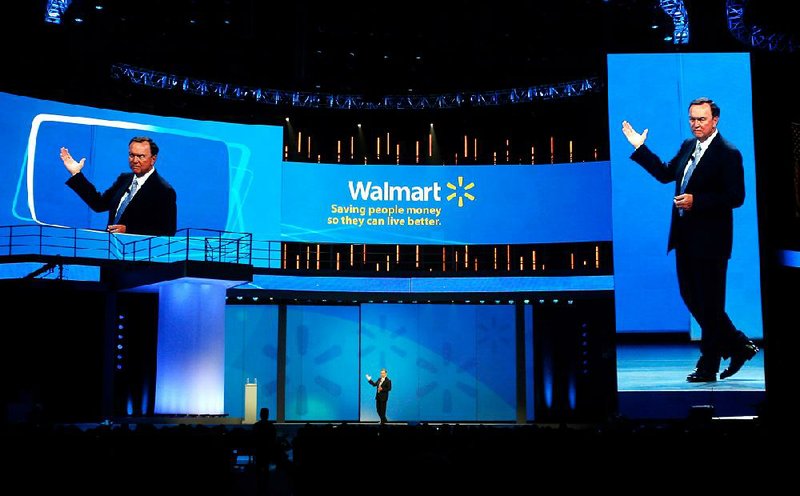LITTLE ROCK — Wal-Mart Stores Inc. is on the upswing as it prepares to host thousands of shareholders and employees from around the world at its annual shareholders meeting Friday at Bud Walton Arena in Fayetteville.
The event comes after a year in which the company reversed a trend of declining sales in stores open at least a year, a key measure of success in retailing.
The company reported first-quarter earnings of $1.09 a share, up from 98 cents a year earlier, beating analysts’ estimates. Same-store sales rose 2.6 percent.
The shareholders meeting — typically a gala affair with big-name entertainers and a celebration of the company — comes at a time Wal-Mart is being investigated for possible violations of the Foreign Corrupt Practices Act resulting from allegations of bribes paid to local officials as the company rapidly increased its operations in Mexico.
Meantime, Bill Simon, president and chief executive officer of the U.S. stores division, attributes the company’s success to its focus on driving down costs. It has increased sales by $24 billion since the end of fiscal 2008 without adding distribution centers, driving fewer miles to deliver goods to stores and a marketing campaign featuring double-digit savings on shoppers’ entire baskets compared with other retailers, Simon said.
“That resonates with the customer,” he said last week. “Traffic drives growth and that’s what we’re seeing.”
Still, Simon said, the retailer sees shoppers buying smaller baskets of goods as they await their next paycheck. And he said the potential for higher gasoline prices could curb shopping trips.
Supercenters remain the company’s best growth vehicle, he said, even as newer versions of the format are smaller than earlier versions. Wal-Mart’s Neighborhood Market grocery stores are approaching returns similar to supercenters, Simon said.
Wal-Mart is tinkering with its small-format Express stores, opening 10 to date, which Simon said became profitable within a year. “We didn’t actually project that,” he said.
Reports of alleged bribery prompted some backlash from institutional shareholders.
The Mexico investigation prompted leaders of New York’s pension fund, with 4.7 million Wal-Mart shares, to say they would vote those shares against five directors up for reelection.
And California’s Public Employees’ Retirement System said on its website that its shares would be voted against re-election of nine board members. The California teacher retirement system also has pledged to vote against current board members.
“I think they have to address that to some extent,” said Patty Edwards, chief investment officer at Trutina Financial, a financial services firm based in Bellevue, Wash.
For the average shopper or investor, she said, the bribery investigation probably doesn’t make much difference. That could change, she said, if it becomes more political.
“If Congress chooses to make it an issue, then it’s going to be an issue,” she said. And that, she said, could affect the company’s stock price.
Simon said at the investor conference that the company has seen no evidence that the Mexico inquiry is affecting its U.S. business.
Michael Duke, company president and chief executive officer, addressed the issue in Wal-Mart’s first-quarter earnings conference call.
“We take compliance with the U.S. Foreign Corrupt Practices Act very seriously and continue to strengthen our anti-corruption programs around the world. The investigation is ongoing and we are working aggressively to determine what happened, and we will take appropriate action if violations of the law or our policies occurred,” he said.
In the meantime, Edwards said, the sluggish economy and warmer-than-normal weather have helped increase Wal-Mart’s business, including an uptick in spring apparel sales.
“The good news is, if they’re selling it early, they’re selling at full price,” she said.
As is typical with big, publicly traded companies, some shareholders have submitted proposals seeking changes in the way Wal-Mart does business.
Mary Pat Tifft, 57, of Kenosha, Wis., a 24-year employee, supports a resolution that would require a company report on incentive compensation plans that she and others say encourages growth that results in declining rates of return on capital investment as new stores cannibalize existing stores.
That, in turn, affects the value of the company’s stock, she said, which she is counting on as she looks toward retirement.
“We feel like they’re investing in new stores that are not always warranted, and they should be investing in existing stores,” said Tifft, who works in grocery receiving at her store.
Her pay has been capped for six years, she said, and she can’t make more unless she moves to a salaried position.
Carlton Smith, 51, a department manager for housewares in Paramount, Calif., also supports the proposal, which he said generally has the support of fellow employees.
“Working conditions have gotten worse,” he said, as the company moves toward more part-time workers and fewer full-time workers. “I would like to continue to work for this company. I just think there needs to be a lot of changes in its policies and practices. There’s a major staffing issue.”
Other shareholder proposals would require a semiannual report on the company’s political contributions and require that at least one board member have extensive experience in health care.
The company’s proposals call for ratifying appointment of Ernst & Young as Wal-Mart’s independent accountants and an advisory vote on the company’s executive compensation.
Business, Pages 65 on 05/27/2012
